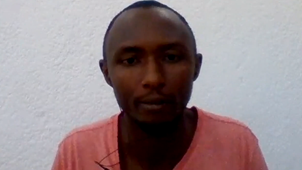 For our meeting September 23, Fulgence Twizermana (Ngozi Rotary Club, Burundi) joined us from Burundi via ZOOM to talk about his efforts to use peace studies in English (where French is the dominant non-African language; a project supported by a Rotary Global Grant) to promote literacy, to help bridge the gaps between antagonistic ethnic groups, and to improve communication with the surrounding countries where English is the dominant non-African language. His focus on English reflects the fact that he has a degree in English pedagogy. Review the recorded meeting and presentation at https://us02web.zoom.us/rec/share/DhavX2pIBkd5TdrZU_Xs3vtcGD5D9ymR2UKs0q7eoLDOmCt3u4ut2Xbnf03yuXzL.vqEghakCLdfp3K_R
For our meeting September 23, Fulgence Twizermana (Ngozi Rotary Club, Burundi) joined us from Burundi via ZOOM to talk about his efforts to use peace studies in English (where French is the dominant non-African language; a project supported by a Rotary Global Grant) to promote literacy, to help bridge the gaps between antagonistic ethnic groups, and to improve communication with the surrounding countries where English is the dominant non-African language. His focus on English reflects the fact that he has a degree in English pedagogy. Review the recorded meeting and presentation at https://us02web.zoom.us/rec/share/DhavX2pIBkd5TdrZU_Xs3vtcGD5D9ymR2UKs0q7eoLDOmCt3u4ut2Xbnf03yuXzL.vqEghakCLdfp3K_RHe started with a video in which he and some of his co-workers explained a number of the programs that they have started to promote peace through English-language learning. They have found that peace-building does not happen without forgiveness. It is essential that the organization includes church leaders and professionals in peace building. They emphasize that elders typically have a lot to teach to younger generations. They have built “peace walls” that trumpet the success of individuals in bringing peace to communities. They have focused on the health of the community through clean-water projects, providing Covid-19 equipment, and emphasizing road safety. Part of the Global Grant has been used to push peace studies into the local university programs. The English-language program includes case studies of successful peace-building initiatives as well as games (role playing?) to learn peace. At the university, they formed a Peace English Club where one of the efforts is to debate how youth can shape the future.
Transitioning from the general to the particular, he gave a brief overview of his own background. He was born in 1986 in an agricultural area of Burundi. His father was a soldier and so was away for much of the time. The people of the area were focused on mutual assistance, so if a family needed food, other families provided it. In 1992 he first heard about the Tutsi and Hutu tribes and their antagonism. In 1993, the elected president of the country was killed in one of the early acts of a civil war. In this war, families of soldiers were commonly killed but his family was protected by their neighbors. They soon moved to a refugee camp where families were disrupted and suicide (including by one of his friends) was not uncommon. Ultimately they moved back to their native area which, although it was changed from the past, was relatively calm while surrounded by the civil war. One of the issues there was the two hours of travel, each way, from their home to employment or fields for farming.